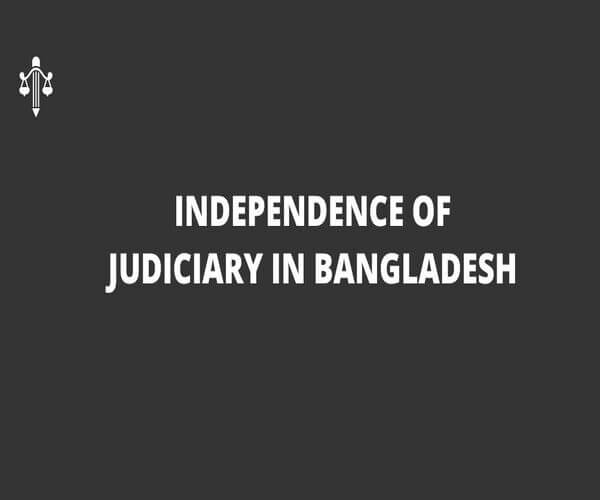The judiciary is more than just an organ of the government and legislative. It is the last hope and goal for citizens to have their rights reestablished in their country. However, the judiciary cannot act to restore these rights unless it is free of excessive influence and intervention from any other organ.
As a result, it is evident that the judiciary must be truly separated in order to conduct its tasks independently, which is the primary goal of the judiciary. And if there is no efficient separation of judiciary, there is no independent of judiciary, and no independent of judiciary means no rule of law. However, mere separation is insufficient to fulfill its role successfully.
The following article will focus on the concepts of “separation of judiciary” and “judicial independence” and evaluate their correct implementation in Bangladesh, as well as some other aspects that are necessary for the separation of the judiciary to assure independence. In 2007, Bangladesh’s judiciary became distinct from the executive.
However, due to some theoretical issues with the justice system, the practice of executive interfering in the judiciary continues in Bangladesh in specific contexts. ‘Judicial independence’ is the idea that the judiciary should be kept apart from the other arms of the government. And judicial independence requires the ‘separation of judiciary’.
Judicial independence implies to both the separation and independence of the judiciary. The Bangladesh constitution, from its inception, established the separation of the judiciary and the executive. However, it was confined to mere documented recognition until to the 2007 ruling in the Masdar Hossain case, which created actual judicial separation and independence.
The Supreme Court’s independence in administration gives rise to these limitations on its staff appointment authority. According to Articles 115 and 116 of the Constitution, the President appoints individuals to hold positions in the judicial branch or magistrates who carry out judicial duties.
Even though the Constitution protects the judiciary’s separation of powers, the executive branch nevertheless exercises influence over the judiciary’s operations in Bangladesh through some of the aforementioned clauses. As a result, the constitution can be understood as a division of the republic’s powers among the three branches of government, guaranteeing the separation of powers in the sense that no branch may overstep its bounds.
In terms of judicial independence and separation, the 1972 Constitution is fairly developed. One of the fundamental elements of state policy, according to Article 22, is the separation of the judiciary from the executive organs of the state. It is difficult for courts to enforce.
The concept of judicial independence contains four fundamental concepts that have been proposed and accepted through worldwide efforts in this sector. The four principles of judicial independence are articulated as follows: Personal independence, Substantive Independence, Internal Independence, Collective Independence,
Personal independence means that judges are not dependent on the government in any way that could influence their decisions in specific situations. Personal independence means that judges’ tenure and terms and conditions of service are “adequately secured so as to ensure that individual judges are not subject to executive control”.
It ensures judges’ impartiality and their ability to make judicial decisions based on the merits of cases, without fear or favor. In identifying the minimal norms of judicial independence, the International Bar Association proposed in 1982 that a judge is subject to nothing but the law and the precepts of his ethics when performing his judicial role!
Internal Independence, we mean the Independence of judges from their judicial superiors or colleagues in deciding the case. Sometimes, threats to internal independence may also come from the superior court or senior judges.
Collective independence refers to institutional independence, which is associated with responsibility for the judiciary’s successful operation as a government organ. In its most basic form, the judiciary as an institution must be free of intervention from the government and legislative. Financial autonomy for the judiciary is closely linked to the concept of collective or institutional independence.
A judge may be unable to exercise judicial functions autonomously unless he or she is a member of an institution with power over those people and physical resources incidental to executing judicial functions. So collective or institutional judicial independence are required to maintain judges’ individual independence.
The main categories under the terms are discussed are – Appointment of judges; tenure of the judges; discipline of judges; adequate remuneration and privileges; institutional independence of the judiciary. Appointment of Judges The basic principle of judicial system.
We are, without a doubt, in a position to install a better democratic system in our society by ensuring judicial independence from the executive organ of the government, but there is still a question about how efficient this system will work if the players and operators of this system are not motivated enough to do so.
As a result, if “separation of judiciary” from the executive organ is the first stage, “impartial judiciary” should be the following step to secure the judiciary’s true independence. There are several more factors that influence judicial independence.

